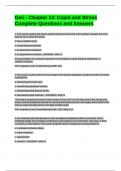-
1. Examen - Healthstream exam: surgeries and procedures questions and answers 100% correct
-
2. Examen - Gms 402 final exam (managerial economics final exam notes) with complete solutions
-
3. Examen - Geri exam 1 practice questions and answers 100% correct
-
4. Examen - Geri actual exam 1 questions and answers 100% accurate
-
5. Examen - Geri final exam questions and answers 100% correct
-
6. Examen - Geri exam 1 test bank| questions and answers 100% correct
-
7. Examen - Geri final exam questions and answers 100% accurate
-
8. Examen - Geri exam 1 questions and answers 100% verified
-
9. Examen - Geri exam 2 practice questions and answers (graded a)
-
10. Examen - Geri actual exam 2 questions and answers 100% correct
-
11. Examen - Geri exam nclex questions and answers (graded a)
-
12. Examen - Geri exam 1 questions and answers 100% verified
-
13. Examen - Geri exam 1| 135 questions and answers 100% correct
-
14. Examen - Geri exam 1 questions and answers 100% verified
-
15. Examen - Geri exam 2 questions and answers 100% correct
-
16. Examen - Geri exam #1 questions and answers 100% correct
-
17. Examen - Geri exam questions and answers 100% correct
-
18. Examen - Geri quiz 1 questions and answers 100% correct
-
19. Examen - Geri mid-term study guide with complete solutions
-
20. Examen - Geri week 2 exam questions and answers 100% correct
-
21. Examen - Some questions geri final with all correct answers
-
22. Examen - Geri chapter 13 pain questions and answers 100% correct
-
23. Examen - Geri exam 2 quiz questions and answers 100% verified
-
24. Examen - Geri midterm practice questions and answers 100% correct
-
25. Examen - Geri chp 12 nclex questions and answers 100% verified
-
26. Examen - Geriatrics nclex questions with all correct
-
27. Examen - Geri nclex: final questions and answers 100% correct
-
28. Examen - Geri final part 1 questions and answers 100% correct
-
29. Examen - Geri test one chapters 1-10 with complete solutions
-
30. Examen - Geri midterm exam questions and answers 100% correct
-
31. Examen - Geri - chapter 13: copin and stress complete questions and answers
-
32. Examen - Geri chapter 5;7;8 questions and answers 100% accurate
-
33. Examen - Ati geri and geri final questions and answers 100% correct
-
34. Examen - Geri nclex ch 9 exam questions and answers 100% correct
-
35. Examen - Geri ch 17 exam questions and answers 100% verified
-
36. Examen - Geri chapter 6 nclex questions and answers 100% verified
-
37. Examen - Geri final nclex questions and answers (graded a)
-
38. Examen - Geri chapter 3 nclex questions and answers 100% accurate
-
39. Examen - Geri nclex questions and answers 100% accurate
-
40. Examen - Comprehensive geriatric assessment exam questions and answers 100% correct
-
41. Examen - Comprehensive geriatric assessment questions with complete solutions
-
42. Examen - Geriatric chapter 7 medications and older adults quiz study questions and answers
-
43. Examen - Comprehensive geriatric assessment exam questions and answers 100% verified
-
44. Examen - Geriatrics/ ltc exam questions and answers (graded a)
-
45. Examen - Geriatrics exam questions and answers 100% correct
-
46. Examen - Geriatrics exam| 97 questions and answers 100% correct
-
47. Examen - (20 - august) comprehensive geriatric assessment (cga) questions and answers 100% cor...
-
48. Examen - Geriatric comprehensive assessment exam questions and answers 100% correct
-
49. Examen - Comprehensive geriatric assessment questions and answers (graded a)
-
50. Examen - Ch 6: comprehensive geriatric assessment questions and answers 100% correct
-
51. Examen - Chapter 4 comprehensive geriatric assessment questions and answers (graded a)
-
52. Examen - Comprehensive geriatric assessment questions and answers 100% accurate
-
53. Examen - Comprehensive geriatric assessment overview-care of older adult-final questions and a...
-
54. Examen - Geriatric nursing exam 1 questions and answers 100% verified
-
55. Examen - Geriatric nursing exam questions and answers 100% correct
-
56. Examen - Comprehensive geriatric assessment questions and answers 100% correct
-
57. Examen - Geriatric exam 1 nclex practice questions and answers 100% correct
-
58. Examen - Geriatric nursing ch. 1,2,3,5, and 10 questions and answers 100% correct
-
59. Examen - Basic geriatric nursing chapter 1 questions and answers 100% correct
-
60. Examen - Geriatrics 1 exam questions and answers 100% correct
-
61. Examen - Chapter 38 geriatrics exam questions and answers 100% correct
-
62. Examen - Geriatric final exam questions and answers 100% correct
-
63. Examen - Geriatric care exam questions and answers 100% accurate
-
Mostrar más




